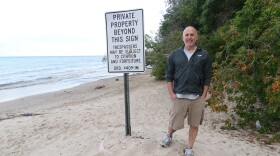All eyes were on Washington, D.C. yesterday as a violent pro-Trump mob stormed the U.S. Capitol building. Lawmakers were forced into hiding and four people died, including a woman shot by Capitol police.
Earlier on Wednesday, the president urged supporters to march to Capitol Hill to protest his election defeat, which he continues to claim without evidence was fraudulent. And as the insurrection took hold, he did little to calm the riots.
Congress eventually resumed and overnight lawmakers confirmed President-Elect Joe Biden’s victory. Trump has now agreed to an “orderly transition” on January 20th. But questions remain about the damage done to the country and if Trump is fit for office.
David Priess is the Chief Operating Officer of the Lawfare Institute. He’s a former CIA officer who writes about the presidency and national security.
Preiss admits that CIA anaylsts are normally better at understanding other nation's politics better then those at home because they are trained to study huge events like insurrections or violence against governmet institutions.
“At CIA I analyzed situations like this in the world, in other countries, and never thought I would do so in our own country,” says Priess. “We’re looking at insurrections, we’re looking at insurgencies, we’re looking at cults of personality that lead to violence against government institutions — the kinds of things that we all thought happened elsewhere.”
But on Wednesday that is exactly what happened in the nation's capitol building. As he watched, he noted the fact that Capitol police seemed to be attempting to push the mob back but that the police were outnumbered.
Whoa: Trump supporters going at it with the police on the steps of the Capitol as Congress counts the Electoral College ballots inside pic.twitter.com/LiQhaa5KkQ
— philip lewis (@Phil_Lewis_) January 6, 2021
“I think that the inability before the event to anticipate what could happen is a tragic error that lead to the loss of life. And there should have been national guard and other authorities visibly present, even if they were there and off to the side,” he says.
That lack of preperation not only allowed for yesterday's breach but could become a playbook for any group looking to cause chaos and destruction.
“The one thing that it points out for, obviously those of us who study terrorism, is how easy it actually was to breach the Capitol, and the lessons for terrorists are horrific,” says Priess.

After scenes of guns being drawn and lawmakers being escorted out to safety, many called on President Trump to condemn the actions of his supporters. While he did ask his supporters to remain peaceful, he continued to push the narrative that the November election had been stolen from him.
I am asking for everyone at the U.S. Capitol to remain peaceful. No violence! Remember, WE are the Party of Law & Order – respect the Law and our great men and women in Blue. Thank you!
— Donald J. Trump (@realDonaldTrump) January 6, 2021
He then released a video which has since been removed from Twitter and Facebook in which he said he loved his supporters but wanted them to go home. Both platforms temporarily suspeneded his account and Facebook has announced they will be suspending his accounts until the transition of power has ended.
This led to many, including the National Association of Manufacturers, Wisconsin Attorney General Josh Kaul and Milwaukee U.S. House Representative Gwen Moore to call for removal of the president from power.
One way that removal could happen is through the 25th Amendment.
“Section 4 is the one by which the President can be removed for disability against his will, and that does require the vice president, and that is essential — it cannot happen without the vice president agreeing to it. It also requires a majority of the executive officers of the executive departments, [the Cabinet],” says Priess.
Priess says Section 4 requires the president to be deemed unable to perform the duties of the presidency. Traditionally that has been thought to apply to cases like a coma or a bad stroke but his lack of action during the unrest at the capitol could be seen as a not performing his duties as president.
“An argument can be made in an extreme circumstance, which this is, that a 25th Amendment Section 4 application is appropriate,” he says.
But there are issues with just using the 25th Amendment. One being that the vice president has to agree to it. That is why others are calling for the House and Senate to take up another impeachment inquiry. Priess says that both could happen so that this major action is not taken on behalf of one branch of government or one process.
“One of the ideas that is out there is why not do both? Why not in an emergency, use the 25th Amendment to remove the powers and duties from the president temporarily after demonstrating unfitness for office but also an inability to fulfill his oath and govern, and then buy time for the House and Senate to act in an impeachment and removal process,” he says.

This event has not only shaken the United States at home but already has drawn statements from other countries. And that event only further errodes relationships with other countries that Priess says have been hurt over the last few years.
“One of the most jarring things for me to see yesterday were statements from foreign countries," he says. "Written like statements that the U.S. government, the state department in particular, used to issue about political violence in other countries.”
He doesn't think that this means that the United States has lost all ability to be a positive force in the world but is a reminder that the U.S. is not immune to issues of political violence.
“The United States, despite its flaws, is largely a force for good," says Priess. "There’s a lot about America that attracts the world. That was not what we saw yesterday. What we saw yesterday was probably the world looking at America saying, 'And you too? This happens there?'.”
This could be a sobering moment for the United States. Priess hopes that this can lead to some sort of change to bring the U.S. back into the global stage as a leader and not an example.
“I don’t want to be the silver lining guy all the time but I gotta say it was a very dark day yesterday. But if there’s a chance for us to rediscover what it is that makes America great and show that to the world again, we can use this as a wake up call and get back to where we should be,” says Priess.







